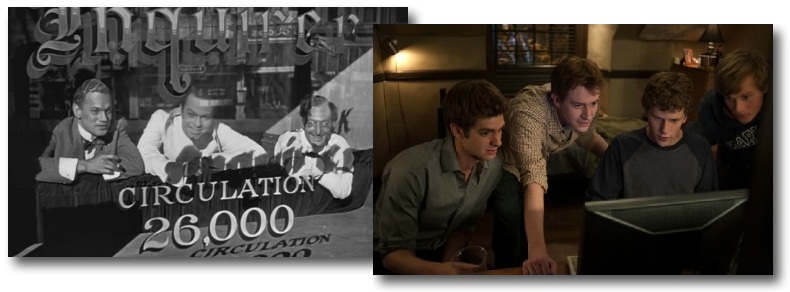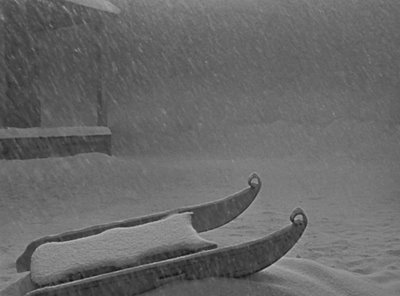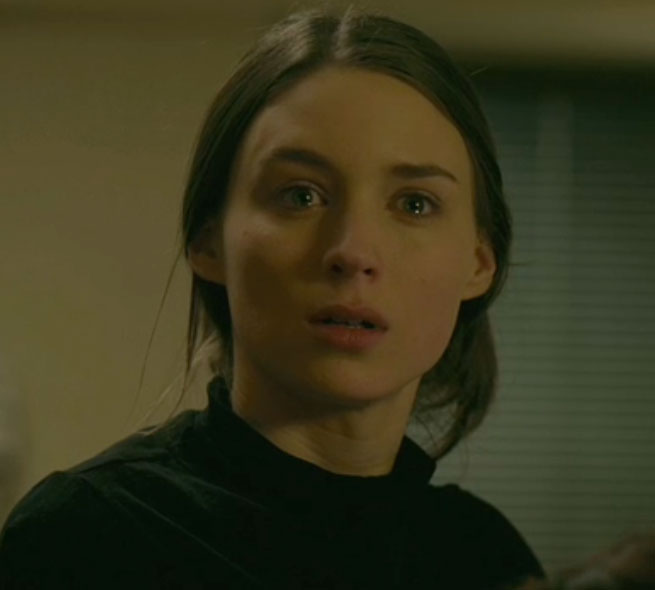Distant Relatives: Citizen Kane and The Social Network
 Thursday, November 10, 2011 at 9:30AM
Thursday, November 10, 2011 at 9:30AM Robert here with my series Distant Relatives, which explores the connections between one classic and one contemporary film. This week a request from Ryan M. Feel free to make your own requests in the comments.

Tell me how you remember it
Last year I compared Citizen Kane and There Will Be Blood as two films about the consequences of achieving the American Dream. Later I compared The Social Network with Raging Bull as two character studies of antisocial overachievers. But all four of these films belong to a sizable sub-genre, the drama about a man who gets everything he wants and nothing he needs. Of the four, the two that go together most closely are Citizen Kane and The Social Network. Citizen Kane, written, directed by and starring Orson Welles as Charles Foster Kane, a newspaper magnate (and fictionalized version of William Randolph Hearst) follows the life of this giant, his friends, his marriages, his successes and failures, his ascension and fall. The Social Network stars Jesse Eisenberg as Mark Zuckerberg (a fictionalized version of Mark Zuckerberg) as he too rises to great heights and how this affects his friendships, relationships and life.
The natural comparisons are obvious. Both are films about men who set out to do something great, accomplish it, and lose something even greater in the process. They're films about how lonely it is at the top. But, with many films in this mold, the devil is in the details. Structurally the two are centrally related. Neither of them has a single narrator, nor do they have necessarily reliable narrators. Both are told in flashback in mostly but not always chronological order. Both stories are told by individuals attempting to answer a question after the fact. In Citizen Kane the question is the meaning of Kane's last words "rosebud" for a news story. In The Social Network, the question is Zuckerberg's intent to steal the idea of Facebook and force out his partner for the sake of a lawsuit. Now we come to our first juxtaposition of the good old days against the new. But it hardly matters. The point is the device which gives a sense of immediacy and relevance to things already past.

Love and Money
Both of these films are certainly about immediacy. These two men make their living not through oil or sport or some old established profession but through media, new media. They influence the world they control and control the world they influence. In their work they shape public opinion, yet ultimately they cannot find a way to shape it in thier favor. There's an irony to the fact that their talents have won them extensive influence, but that extensive influence cannot convince anyone to love them. And love, and acceptance are what these two men are truly after. Kane's friend Jed Leland says as much, that what he really wanted was to be loved. Zuckerberg too demonstrates his desires through his continual search for approval from Erica, the girl who got away. And perhaps it's just a slight bit of spite toward the Winklevoss twins, members of the crew team, the epitome of Erica's "type' in a mere throwaway comment, that motivates Zuckerberg to be the jerk that he becomes. Much in the same way Kane's initial pure intentions are tainted every so obviously by the way the newspaper business allows him to expose and punish his foster father.
 Yet we've barely scratched the surface of these two films. Within these worlds there are also smaller tales of ego-driven misogyny, domination over and objectification of women, of friendships terminated with a termination, of defiance in the arms of authority, of paths never taken. That last one may be a key too. To many, the most memorable moment in Citizen Kane doesn't involve its star at all. It comes in a brief monologue by Everitt Sloane's Mr. Berenstein who speaks of a pretty girl with a parasol he saw once and has never forgotten. These are films about memories, the remembered lives of men who build empires to compensate for the shadows of their pasts. And those pasts are forged by regret of actions not taken or actions not possible (like Mr. Berenstein's lost girl), and the desire to rise above them, take control of a life and become a giant. Citizen Kane and The Social Network are films about men who are giants who can't escape the small truths of their lifes.
Yet we've barely scratched the surface of these two films. Within these worlds there are also smaller tales of ego-driven misogyny, domination over and objectification of women, of friendships terminated with a termination, of defiance in the arms of authority, of paths never taken. That last one may be a key too. To many, the most memorable moment in Citizen Kane doesn't involve its star at all. It comes in a brief monologue by Everitt Sloane's Mr. Berenstein who speaks of a pretty girl with a parasol he saw once and has never forgotten. These are films about memories, the remembered lives of men who build empires to compensate for the shadows of their pasts. And those pasts are forged by regret of actions not taken or actions not possible (like Mr. Berenstein's lost girl), and the desire to rise above them, take control of a life and become a giant. Citizen Kane and The Social Network are films about men who are giants who can't escape the small truths of their lifes.
Other Cinematic Relatives: Giant (1956), The Godfather part II (1974), The Aviator (2004), There Will Be Blood (2007),



Reader Comments (6)
This reminds me of last winter, when I was trying to convince my best friend that he should see "The Social Network." He's a software developer, and told me that he didn't want to see "a film about coding." I replied that calling "The Social Network" "a film about coding" was like calling "Citizen Kane" a film about newspaper typesetting.
I always thought TSN warranted a more interesting connection to Amadeus.
Yes, Amadeus is probably another cinematic relative. Though, to toss something out there, The Social Network, at least, is also a relative of The Pirates of Silicon Valley.
Hooray! Thanks for selecting my pick, Robert, and awesome write-up!
Great read! One huge reason I love TSN is it has a thematic, stylistic and narrative resemblance to the classical Hollywood cinema like Citizen Kane and the Godfather trilogy about money, a tragic capitalist hero (in films like Kane/TSN, whose myth is told from multiple perspectives), his American dream of success and the price he has to pay.
"... films about men who are giants who can't escape the small truths of their lives." -> Exactly.
Drive and Chinatown - potential distant relatives?